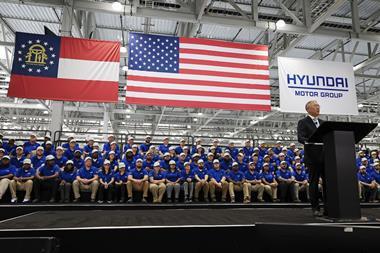
IAG’s perspective is just one of many in a competitive automotive air cargo market but there are clear trade flows emerging that show how automotive manufacturers are currently using air cargo services. We have identified five: Germany to China; China to the US; China to Japan; Germany to the US; and the US to China.
Asian car manufacturers looking to grow market share have driven much of the demand for time critical services. This has resulted in strong demand in automotive parts to Asia from which airfreight has naturally benefited. Alongside this, manufacturers in emerging markets have challenged traditional cost structures so that suppliers and manufacturers need to continually focus on the just-in-time (JIT) processes.
In the established markets of Europe and North America it seems that much of the demand is for spare parts to fix the large number of aging vehicles in these regions. China, of course, has its fair share of aging vehicles but there is also demand from the growing middle class in the country for new European and American vehicles. This continental interdependency and demand for high-end European cars in Asia (followed by parts when the cars age) and low cost spare parts from Asia to Europe is driving trade growth.
The benefits of air cargoAirfreight is ideally suited to the JIT manufacturing processes favoured by automotive manufacturers. Abnormal weather conditions aside, air cargo can get to its destination in hours rather than days. In the case of a manufacturing crisis, such as a parts recall, the rapid reactivity of air cargo can get manufacturing back on track in a short time, saving automotive companies hundreds of thousands – if not millions – of dollars in lost time and productivity.
Our recent experience with Renault is testament to this, where IAG shipped a vital replacement part on behalf of Renault for its car assembly plant in Mexico. While the part on its own may have been of limited value, the impact of its potential prolonged absence and the inability of the plant to produce vehicles until its arrival would have been considerable.
Air cargo is therefore an important link in a JIT supply chain, enabling automotive manufacturers to reduce downtime on the assembly line and thereby maintain profits. By helping manufacturers manage costs in this way, air cargo services also indirectly contribute to keeping the sales price of vehicles down, helping manufactures meet customer expectations.
The right air cargo serviceHowever, as automotive manufacturers look to leverage the efficiency and speed of air cargo, it is important they source the right services. One of the key things to ensure is that any air cargo partner can offer both general and time-critical freight services. The former is lower cost, and therefore well-suited to servicing business-as-usual parts shipments. General freight is also ideally suited to reverse supply chain requirements, such as returning surplus parts to the supplier.
Time-critical services, meanwhile, are essential for reacting to unplanned disruptions to the supply chain where urgency is everything. When selecting a time-critical product, manufacturers should look out for key details, such as whether the carrier offers an absolute guarantee of flying for urgent shipments, what the drop off and collection times are, whether the parts are tracked and monitored throughout the process, and whether fast track check-in areas are available at important destinations. Every one of these stipulations add up to incremental efficiency gains that could end up saving the manufacturer significant amounts of money.
The increase we are seeing in automotive air charter shipments is here to stay. In fact, new approaches to the purchase of automotive parts, particularly e-commerce, might accelerate growth. Companies like Amazon and eBay have set up tailored automotive parts sections that essentially act as one-stop shops for parts. With the speed-to-market that the likes of Amazon and eBay demand, airfreight can expect to capitalise on this emerging channel.
Airfreight adds real value to automotive manufacturers, helping them manage their supply chains, control costs and reduce inventory. As the industry continues to globalise and new digital commerce platforms come on line, we believe the value of air cargo will only become more obvious.
Daniel Johnson is manager, Global Products, IAG Cargo

























![Global[1]](https://d3n5uof8vony13.cloudfront.net/Pictures/web/a/d/s/global1_726550.svgz)










